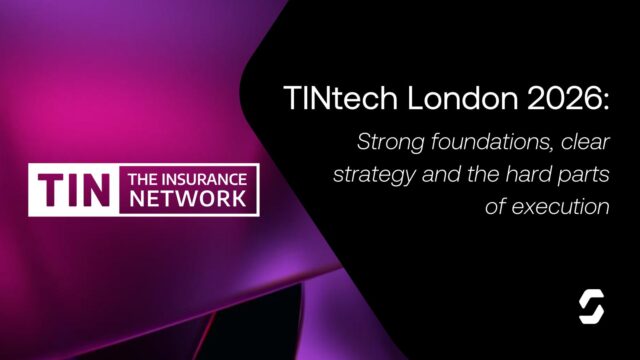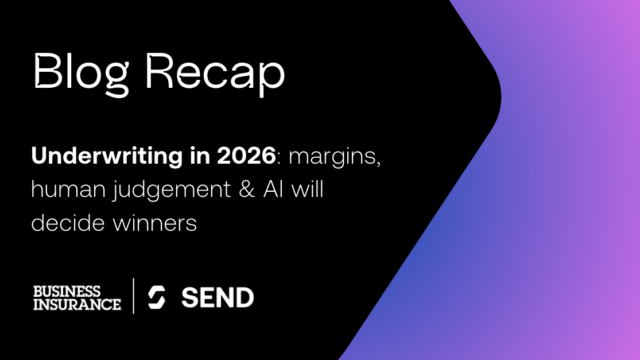INFUSE Recap: Insurance Talent Panic - Insiders Drop Truth Bombs
The insurance talent shortage is no longer looming. The crisis is already here. The US Bureau of Labor Statistics has reported that by 2026, in less than six months, four hundred thousand insurance workers are set to retire from the industry. Does the industry have a strategy to tackle this exodus? Can the industry appeal to Gen Z and Millennials to consider a career in Insurance? Will the boomers successfully pass on essential underwriting skills to the new workforce?
At Send’s latest INFUSE webinar, the panelists outlined factors influencing the insurance talent crisis in detail. Suzanne Bray, Head of Talent & Growth at Convex, suggested that the combination of COVID-19 and insurance companies freezing intern and graduate programs during the pandemic might have worsened the impending crisis. While she laid out a set of strategies to attract younger professionals, she recommended hiring talent from other sectors such as banking who have transferable skills into insurance. Insurance veteran Rose Hall, Founder and CEO of RH Business Ventures highlighted that mass exits might not be the immediate trend as many seniors are looking to extend their careers as consultants and transfer key skills to the Gen Z. She also suggested that the young demographic was already AI native but needed rigourous leadership skills to carry the industry forward.
In the era of profound change, can the industry bridge the talent gap and reinstitute a new generation of insurers? Read on.
Did COVID-19 worsen the talent exodus in Insurance?
The insurance industry has long been plagued by a supply-and-demand imbalance when it comes to talent. The pandemic further fueled a tsunami of resignations in 2020. Experienced underwriters decided to exit the industry due to uncertainty, and many insurers froze their internship and graduate programs. This has left the industry with seniors on the brink of retirement and a shortage of young talent to succeed them. Due to the pandemic, many seniors switched to remote working positions, and not all have returned to the offices. The freshers who now work from the office are left without guidance, which causes hindrances in talent transition and eventually succession.
How to get Gen Z and millennials to work in insurance?
The Insurance industry comes with a reputation for being ‘mundane’. Talent managers, and insurance leaders as a whole, must give a makeover to the industry and offer a value proposition to introduce Gen Z and millennials to the talent pool.
Upgrade to latest technology: Insurers must adopt AI and powerful technology to showcase the technical prowess of the organization. Automation will be a powerful driver of talent, enabling them to do more with fewer resources. With automation tools in place, industry veterans can not only utilize their time to focus on human-centric work but also focus on the knowledge transfer to the next generation.
Hire Talent from other industries: Candidates from sectors like banking can bring transferable skills to the insurance industry. Suzanne Bray, Head of Talent & Growth at Convex has earlier hired talent for underwriting roles from firms like Goldman Sachs. She confirms that these candidates bring with them client relationship skills and only need to be taught the technical insurance skills, which they pick up quickly. This also brings a sense of variety in their career, which is very desirable among the younger workforce.
Work Flexibility: Suzanne also recommends that insurers introduce flexibility in their workspace to attract Gen Z and Millennials to the industry. While interacting with young talent, one of the main considerations they often bring up is how they work, where they work and when they work. Gen Z and the millennials are looking for a value proposition that is unlike the traditional insurance nine-to-five work routine.
Leadership Skills: Gen Z is well-versed in AI and has a hunger to learn. Insurance veteran Rose Hall feels that the biggest skill needed for the next generation of insurers is Leadership. She feels it is going to take a different kind of leader to function in an AI world. She recommends reverse mentoring in the industry, where current leaders can pick up digital skills from Gen Z and they can impart traditional insurance skills to the younger lot. In this way, we keep the interest levels high among the next generation and avoid boredom.
Are seniors exiting immediately? Maybe not!
Although there is a fear of mass resignations by the end of the year, the situation may not be dire after all. Insurance veteran Rose Hall confirms that most of her senior friends from the industry who are on the verge of retirement are still hesitant to take the plunge. One of the reasons may be to improve their financial strength before they retire. But the main reason is loss of their networks. Most insurers build friendships around their business and are fearful that they might lose them if they retire. So the exit is impending, but might also be delayed. The good news is that the senior talent is looking to use the extra years to find their successors.
“ Those who are exiting are being inclusive of the next generation. I've talked to a couple of people recently who said they were hiring for a role keeping their successor in mind. They're really looking to pass down their legacy.”
-Rose Hall, Founder and CEO of RH Business Ventures
As the webinar closed, the panellits shared their final thoughts on the future talent in the industry.
- Rose Hall urged fellow insurers not to be apologetic about being from the industry. She recommends that every insurer turn their legacy industry into a cutting-edge one.
- Suzanne Bray suggested that insurers be innovative with their value proposition to attract and retain new talent in the insurance industry.
Tackling the talent acquisition demands proactive steps. Expanding the talent pipeline beyond traditional sources and courageously rethinking your approach is a must. By broadening our view and embracing innovative talent acquisition strategies, we can redefine the future of the insurance workforce.
Keen to learn more? You can watch a recording of the webinar here.
- Insights
Related Resources
Underwriting Resources
Underwriting Maturity Framework: Moving from a process-driven to a data-driven operating model
Top 10 insurance industry trends shaping underwriting in 2026




